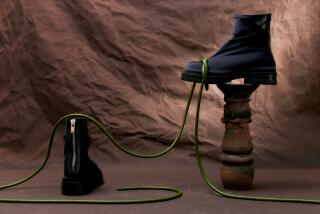SHOPPING : Value System : A person’s finances rarely determine buying style. Upbringing may be a more telling factor.
- Share via
Anyone who looked in my clothes closet would know the truth in an instant: I’m no fashion expert.
There are wool jackets I can’t throw out because they still remind me of San Francisco. Silk dresses I should give away because a recent book said they’re not my best color. Shoes that look odd now but could come back into style. Pants that aren’t particularly chic, but I love their forgiving waistband. Skirts I keep in case I ever come down with anorexia.
But the most telling thing in my closet has nothing to do with what’s actually draped over hangers. At least, that’s what Ray Brown, chairman of the Department of Popular Culture at Bowling Green University, has suggested.
What people buy, he said, isn’t as revealing as how they have gone about buying it.
“Basically, there are two types of people,” Brown said. “People who love getting a bargain, and people who love paying full price.”
Despite the obvious difference, he added, there is a tie that binds them. “When you think about it, they both get the same kicks. One can brag about throwing away $500, the other can brag with just as much pleasure about saving $2.”
Celie Cunningham, a GTE administrator in Westlake, identifies more with the first category.
“I’m bad. If I want something, I’ll pay for it,” Cunningham said. “If I see something in one store and the store’s closed, I’ll buy it for more at another store. It really irritates my husband, who’s a bargain hunter.”
Jeanette Herrera of Santa Paula, on the other hand, said she couldn’t imagine that kind of behavior. “I’ll go from one store to another to find out where I can get something the cheapest,” she said. “Money doesn’t have that much to do with it. I just love a bargain.”
So what’s responsible for such different buying styles? Psychiatrists and psychologists who have been asked that question by marketing and advertising professionals said it’s a combination of factors. But how much money a person has, surprisingly enough, isn’t usually part of it.
Joel Yager, a psychiatrist at UCLA and an expert on fad buying, said studies have shown that a person’s economic situation rarely affects buying style. Instead, he said, it often comes down to values.
“There’s a line in the movie ‘Annie Hall’ that explains a lot of it,” Yager said. “In the movie, Diane Keaton says, ‘In my family, it was a sin to raise your voice.’ Woody Allen replies, ‘In my family, it was a sin to buy retail.’ A lot comes from a family’s value systems.”
In some families, parents will emphasize quality over cost, he said, so that getting the best will always be important. Other parents will stress getting the best value for one’s money, and that’s where the bargain hunter comes from. In the third type of family, Yager said, parents will focus on conspicuous consumption and foster the attitude of: “You are what you own.”
Yager didn’t mention what happens to the kids when one parent gets mad about the purchase of a more expensive brand of toilet paper, and the other parent takes the kids shopping to make them feel better about it.
But if Yager ever wanted to know more, it would certainly be easy for him to find out.
He’d have a field day in my closet.
THE PREMISE
Ventura County is teeming with the fashionable and not so fashionable. There are trend-makers and trend-breakers. There are those with style--personal and off-the-rack--and those making fashion statements better left unsaid. Twice a month, we’ll be taking a look at fashion in Ventura County--trends, styles and ideas--and asking you what you think. If you have a fashion problem, sighting or suggestion, if you know a fashion success or a fashion victim, let us know. We want to hear from you.






